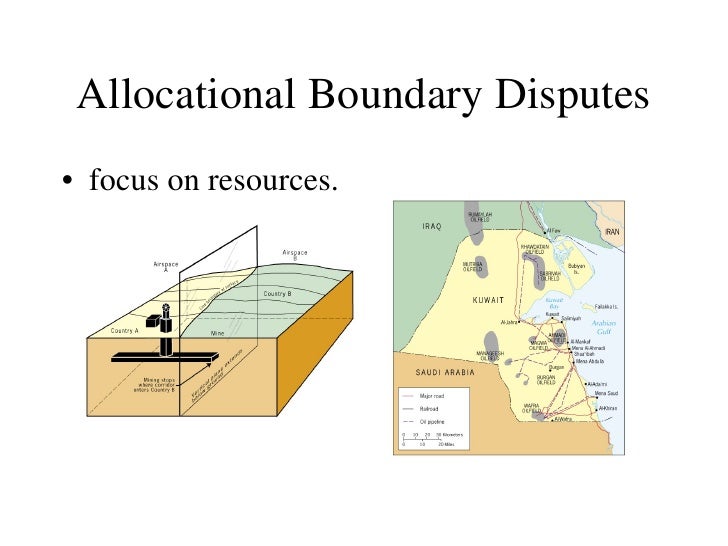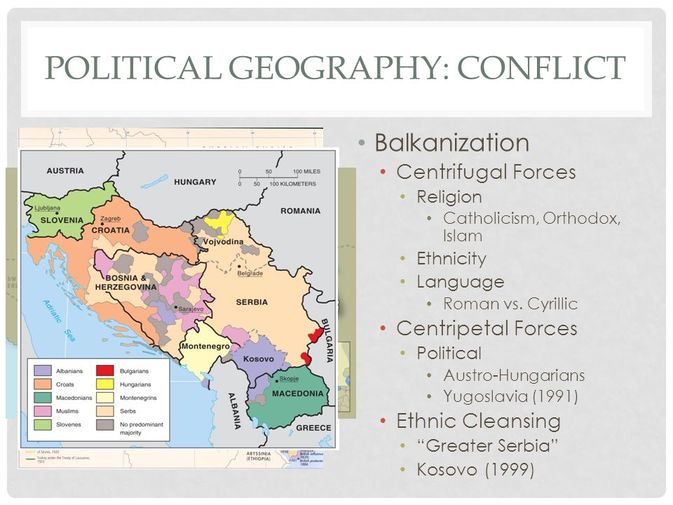Locational Boundary

A boundary dispute over the 'allocation' or distribution of natural resources is an allocational dispute. A definitional dispute is a boundary dispute over the legal terms set forth, a locational dispute is a boundary dispute over the physical location, and an operational dispute is a boundary dispute over how the boundary ought to function. Exceptions to the above are where: the title will remain limited as to parcels or an interim title r 3.2.3(a)(iv); or the boundary is a water or irregular boundary r 3.2.3(a)(v); or the boundary is for a covenant r 16. If a boundary meets either class C or class D criteria r 3.2.3 and r 3.2.4, then either of the classes may be used. Boundary and territorial disputes are often the result of divergent material claims, especially regarding land, fresh water, and mineral and energy resources. This has particularly been the case in the international context, where sovereign control within one's territorial boundaries is thought to be a defining characteristic of a state ( Wendt.
There are hundreds of disputes between states today that derive from disagreements over shared boundaries or territory that each claims. These disputes arise for many reasons, but the desire for territorial expansion, irredentism, an historic lack of cartographic precision, or disagreements over formal, written documents are common causes.
In general, every boundary dispute can be classified in one of four ways: positional (also definitional), territorial (also locational), allocational (also resource), or operational (also functional). This classification gives insight to the reason for the dispute.
Locational Boundary Dispute Definition
Positional disputes are often also referred to as definitional disputes because the two parties hold differing interpretations of the written description (or definition) of the boundary. These written documents, often treaties, might include language that each state interprets differently, especially if there are ambiguous or poorly worded phrases.
For example: In 1825, Britain and Russia signed a treaty to establish territorial claims in what today is Alaska. The treaty stated: “the said line shall ascend to the north along the channel called Portland Channel as far as the point of the continent where it strikes the 56th degree of north latitude; from this last-mentioned point, the line of demarcation shall follow the summit of the mountains situated parallel to the coast as far as the point of intersection of the 141st degree of west longitude.” The vague phrase about the mountains, was further clarified, but it remained indefinite. When the US acquired Alaska in 1867 from Britain, it inherited the dispute. It was partially resolved in 1903, but affected US-Canadian and US-British relations for decades.

While territorial may sound the same as positional, it is not. In the case of border disputes, a locational dispute is not over the written definition or treaty that established the border. Rather, these disputes most often occur when the border is physical, such as along a river or in mountains. Many of these borders were set when precision in those regions was not considered critical for clarification. In other cases, the physical border may have changed over time, such as a river changing course. In such an instance, the river border, as written in the definition, is not disputed, but the location has changed and land that once belonged to one state might now be claimed by the neighboring state.
For example: The border between Uganda and the Democratic Republic of Congo was always considered the River Semliki. However, since 1960, the rate of mountain glacier melt has increased and the river’s course has changed many times. Satellite imagery reveals over 100 changes and widened considerably in that time. In turn, some towns that were once Ugandan and now Congolese and vice versa. The changing location only became one of concern and dispute when the area containing oil was affected by the changing course.
While the Semliki river example clearly demonstrates a locational dispute, the dispute could evolve to be a resource one, as well. In allocational disputes, states disagree about the rights to or proportionate distribution (allocation) of natural resources in the border region. These disputes are almost always the mineral, oil, natural gas, or water resources that do not coincide with human-created political borders.
For example: The massive Rumaila oil field lies beneath Iraq, with a small section underlying Kuwait. It is of incredible significance to Iraq, as it is considered the third largest field in the world. In the years leading up to Iraq’s invasion of Kuwait in 1990, Saddam Hussein accused Kuwait of producing more oil than treaties established, alleging that Kuwait was slant-drilling into Rumaila to drill for oil under Iraq. This claim was used to justify Iraq’s military attack in August 1990.
Operational (or functional) disputes arise when two states disagree about the official management of the border. People and goods cross borders, for both good and malicious reasons. In order to protect the security and economic interests of the state, the government must actively manage its borders. Disputes may be related to the erection and maintenance or border markers, fences, or walls; immigration policies and border control; and cross-border transportation of goods, both legal and illegal.
Definitional Boundary Dispute
For example: The US and Mexico are in regular communication because of disagreements about the shared responsibility of controlling the massive, shared border. The daily exchange of illegal drugs in both directions is the source of one such dispute. Both states agree it is a shared responsibility to stem the flow of the illicit products. However, the two regularly disagree over the specific strategies to employ and degree of financial responsibility of each government. Complicating the issue is that both the US and Mexico are federal states, so each US border state and each Mexican border state are involved in the border’s operation.
As is clearly evident, there are many potential sources of conflict along international borders. Some of these disputes cause little harm and are rarely discussed between the states. However, some current disputes are the source of daily violence and the loss of life.

Details | Click here to study/print these flashcards. Create your own flash cards! Sign up here. Additional Geography Flashcards |

Cards Return to Set Details
Term
| Definition
| ||
Term
| Definition
| ||
Term
| Definition
| ||
Term
| Definition
| ||
Term
| Definition
| ||
Term
| Definition
| ||
Term
| Definition
| ||
Term
| Definition
| ||
Term
| Definition
| ||
Term
| Definition
| ||
Term
| Definition
| ||
Term
| Definition
| ||
Term
| Definition
| ||
Term
| Definition
| ||
Term
| Definition
| ||
Term
| Definition
| ||
Term
| Definition
| ||
Term
| Definition
| ||
Term
| Definition
| ||
Term
| Definition
| ||
Term
| Definition
| ||
Term
| Definition
| ||
Term
| Definition
| ||
Term
| Definition
| ||
Term
| Definition
| ||
Term
| Definition
| ||
Term
| Definition
| ||
Term
| Definition
| ||
Term
| Definition
| ||
Term
| Definition
| ||
Term
| Definition
| ||
Term
| Definition
| ||
Term
| Definition
| ||
Term
| Definition
| ||
Term
| Definition
| ||
Term
| Definition
| ||
Term
| Definition
| ||
Term
| Definition
| ||
Term
| Definition
| ||
Term
| Definition
|